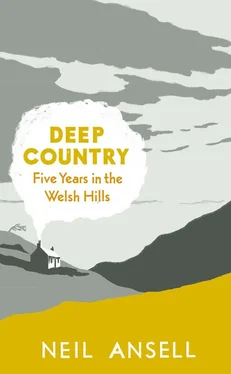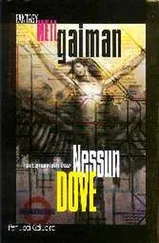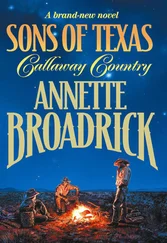I lived alone in this cottage for five years, summer and winter, with no transport, no phone. This is the story of those five years, where I lived and how I lived. It is the story of what it means to live in a place so remote that you may not see another soul for weeks on end. And it is the story of the hidden places that I came to call my own, and the wild creatures that became my society.
I first came to the cottage on an autumn night the year of my thirtieth birthday, setting off at four in the afternoon from London straight after working a double shift. I hadn’t expected to make it that night, and had arranged to stop over with friends in Swindon and continue my journey in the morning. But the first truck that picked me up from the start of the M4 took me clear through to Leigh Delamere Services, so I decided to press on. Things slowed down after that as the roads got less and less busy. I was dropped off at midnight in the village by the last lorry driver of the day, said my thanks and got out my hand-drawn map. I took the bridge across the river, then headed into the lanes. The cottage is three miles from the village, along lanes that get progressively narrower and steeper and finally give way to a dirt track. As I walked, tawny owls called my way, the too-whit of the females, the too-whoo of the males. I counted five territories, it felt as though I was being handed from one to the next like a baton in a relay race. There was no moon but the Milky Way was a bright smear across the sky. From the last farmhouse there were seven gates to open and close, and I followed the track rather than cut across the fields even though it was so steep the trail wound drunkenly back and forth.
Although later I would prefer to take my night walks by starlight alone, everything was new to me then and I carried a torch. Everywhere it shone, eyes were reflected back at me; there were rabbits lined up along the edges of every field. I didn’t know it then, but they were at their peak. Soon, myxomatosis would hit again, and the population would crash to almost nothing, before slowly beginning to rise again. Although if you know where to look you can see the cottage like a beacon on the hillside from the main road ten or fifteen miles south, once you leave the village the lay of the land makes it disappear from view until you have closed the last gate, turned the last corner, and the track finally levels off. And there it was that I caught my first glimpse of Penlan Cottage, nestled against the hillside, surrounded by a ring of ash trees. After the steep trek into the darkness of the mountains it was a welcome sight. It looked like home.
From its northern aspect at least, the cottage looked like a child’s drawing of a house; four square windows, a central door, a steeply pitched roof, a tall smoking chimney stack and a tree to either side. From the south, it looked more like a shed, as it had been weatherproofed with corrugated-iron cladding and painted cream. It looked bad, but was probably necessary, for it was so exposed to the elements. A friend once described it as the only place he had ever been where it rained uphill. There was a porch too, a slab of stone, a timber frame clad again with corrugated-iron sheeting. This was a fine place to sit and look out across the valley, and when it was wet the rain would clatter on the metal roof like gunshot. Beside the porch was a sprawling cotoneaster, and I would transplant a wild honeysuckle from the woods which would grow to drape over the entire porch and fill it with a nectar that would attract hawkmoths, including sometimes the elephant hawkmoth, in pastel pink and mossy green, to my eyes more beautiful than any of the butterflies we have here in Britain. There were two windows facing south, from the living room and the main bedroom above, and the stone walls were sufficiently thick that the sills inside were deep enough to sit in should the weather drive me in from the porch. It was a view that never ceased to draw the eye. Either side of the house there was a single narrow slotted window. The place was a Victorian gamekeeper’s cottage, and these windows were designed for keeping an eye on the pheasant pens on each side of the building. The one to the west looked out across the moors. You could cross two fields and you were on open moorland; you could walk west for twenty miles without seeing another house, or a road, or a fence. This uninhabited swathe of the Cambrian Mountains right in the very heart of the country has been called the green desert of Wales, its empty quarter.
Just downhill across the track there was once a farmhouse, presumably Penlan Farm. An overgrown rocky mound in the approximate shape of a large building from which now sprout full-grown ash trees, it is not so much a ruin as the ghost of another era. This landscape is far wilder than it once was; the hundred-and-twenty-acre hill farm around me now barely supported a single elderly tenant farmer, yet scattered around its fields were the remains of five farmhouses or labourers’ cottages, and a mill. With mechanization came massive depopulation, as people moved first south to the mines, and then much later to the cities of the South Wales coast, and further. The world may be filling with people, but there are still a few places that buck the trend and are being left behind, abandoned by the gathering crowds.
The cottage had been built out of rocks scavenged from the ruins of the farmhouse, and placed back in the quarry from which they were excavated. Penlan was tucked into this scallop that had been scooped out of the steep hillside, the rock wall behind it was as high as the guttering of the roof. What induced the builders to site the cottage above the water-table I cannot imagine. The spring emerged just below my track, and was piped to a well fifty yards down the front field, where its overflow was piped on to provide the water supply for the farmhouse out of sight at the bottom of the hill. There were two rainwater-butts, fifty gallons in all, which would do for the garden or for washing, though the water needed to be boiled before it was fit for drinking, while the spring water was sweeter than any tap water.
There are not many places left like this. The cottage is part of a big estate, but when all the other estate buildings were modernized, it was decided that Penlan was just too remote to make it worthwhile, so it was left as it stood, with no electricity, no gas, no running water or plumbing. No one had lived here for nearly fifty years, it was a relic of a way of life long gone, which the world no longer wanted. It was the highest and remotest cottage on the estate, but was also considered to be the one with the most outstanding view. The mountains on the southern horizon were twenty-five miles away. Many other homes in the area gave a glimpse of these far hills, but most houses were built in little valleys or folds in the mountain, or somewhere there was a modicum of shelter from the elements. Penlan had been built without any consideration for the comfort of its occupants and was on such a high, exposed ridge that its horizon was a panoramic sweep that stretched fifty miles or more from east to west. It hovered over the world.
My friends had taken on the cottage earlier that year and had visited just once. They had attempted to start a fire, and the chimney had caught alight from the generations of jackdaw nests that filled it. After my first visit, I came again and again, I spent Christmas there, and saw in the New Year at the very top of my mountain. It takes longer to climb than you expect; there is one false summit after another, and then you suddenly reach the hilltop cairn almost as you are upon it. Sitting at the cairn you can see only a disc of around fifty yards around you, then the hillside falls away too steeply to be seen. It was a clear night and there was barely any grass there, just a forest of silvery lichen that looked almost fluorescent in the moonlight. The neighbouring peaks were smeared with snow, and all around there was a frozen silence.
Читать дальше












